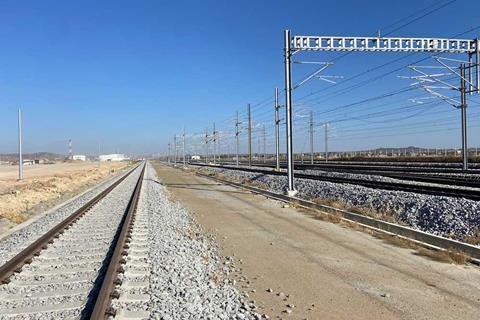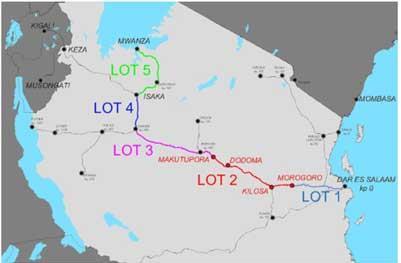Travelling at high speed across vast distances in a modern passenger train, relaxing in a comfortable seat, low noise, while gazing at the breath-taking natural landscape of this Eastern African nation. This is Tanzania’s future of travel and transportation, in sharp contrast to currently bumpy, sandy roads, rolling at about 20–30km/h through the streets or stuck in stop-and-go traffic for hours.
Less traffic – travelling faster
Now, the new Standard Gauge Railway System (SGR) is being built in Tanzania to improve the conditions for freight and passengers. The main aims of the SGR are to reduce costs and remove traffic congestion on the street, to carry freight and passengers safely and faster, to reduce CO2 emissions and to increase social and economic value in the country. Overall, the new SGR in Tanzania is efficiently contributing to a sustainable railway development plan and to the UN Sustainable Development Goals.

Growing economic opportunities
In total the SGR line, known as the Central Corridor, consists of about 1,200 km of railway, and links the port of Dar es Salaam on the Indian Ocean to Mwanza at Lake Victoria in northern Tanzania. With branches to be built in the neighbouring countries (Rwanda, Burundi and the Democratic Republic of the Congo (DRC)), it promotes cross-border trade. At the port of Dar es Salaam, the connection to the Indian Ocean paves the way for business opportunities to the land-locked countries of that region.
The new Standard Gauge Railway system is being constructed in five phases:
- Phase 1: 205km (Dar es Salaam–Morogoro);
- Phase 2: 336km (Morogoro–Makutopora);
- Phase 3: 294km (Makutopora–Tabora);
- Phase 4: 130km (Tabora-Isaka) and
- Phase 5: 237km (Isaka–Mwanza).
(number of kilometres only refers to the main line, not including branch lines, source: ESIA studies)

The development of the railway system as a whole is not only a more sustainable transport option for people and freight, but it also opens up economic development. It is expected to make a major contribution to the overall economic situation of Tanzania and the entire region. The reduction of transport costs due to infrastructure that makes transport faster and easier makes local products more competitive internationally and it also reduces the cost of domestic and imported products for East African consumers and businesses.
Engineering, procurement and construction contractor (EPC) for building the SGR project is Yapi Merkezi, a Turkish company. It is currently successfully constructing the first phase of the SGR that has almost been completed and has started constructing the second and third phases as EPC Contractor (Engineering, Construction, Procurement).
Fast and climate-friendly
The whole SGR line will be a high-speed line run by electrified trains. Tanzania is the first country in the region to have electric trains. With a speed of 120km/h (75mi/h) for passenger trains and up to 160km/h (99mi/h) for freight, the SGR will be the fastest railway in East Africa and using climate-friendly and clean technology.
This huge project, amounting to approximately USD 10 billion in total (about EUR 9.2 billion), brings value and challenges. It creates a lot of economic value for the country while simultaneously environmental and social challenges need to be handled. An Environmental and Social Management and Monitoring Plan for all phases of the project is in place to proactively monitor and mitigate any adverse impacts that could arise in this context. “We are honored to be part of this landmark project that will greatly benefit the people and economy of Tanzania. This development will not only drive economic growth within the country but also create opportunities and enhance connectivity for neighbouring nations,” said Ibrahim Karahan, Project Finance Director of the Turkish construction company.

Meeting Sustainable Development Goals
KfW IPEX-Bank is substantially contributing to the financing of this project as part of an international banking consortium. KfW IPEX-Bank uses its in-house expertise to implement its Environmental and Social Sustainability Guidelines (Action Plan guidelines) and to meet the Equator Principles. The project contributes to Sustainable Development Goals like SDG 1 “no poverty” by creating new jobs (in the first and second phases, 12,000 new jobs were created by Yapi Merkezi), SDG 9 “industry, innovation and infrastructure” and SDG 13 “climate action”.
“We are proud to contribute with our financing to this important railway project that will allow sustainable, safe and fast travel in Tanzania and bring freight from congested roads to climate friendly trains,” said Sylvia Sedlacek, Project manager and Business Development at KfW IPEX-Bank.

















